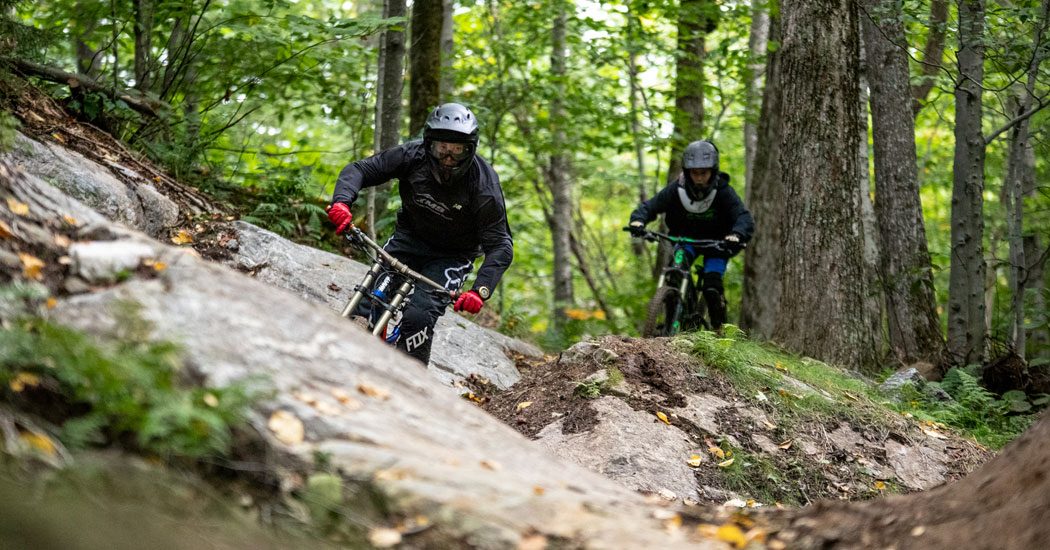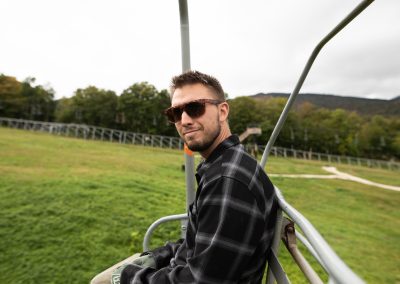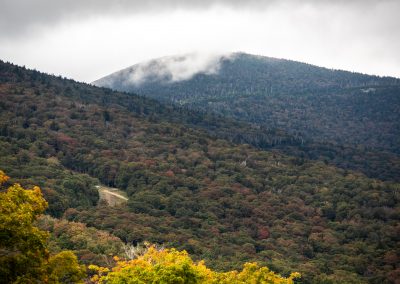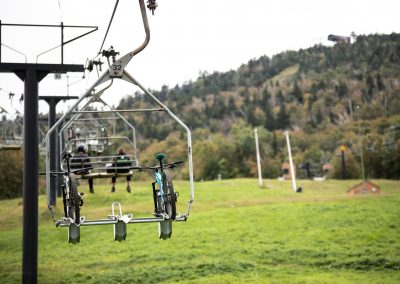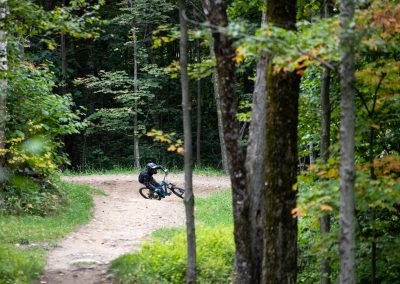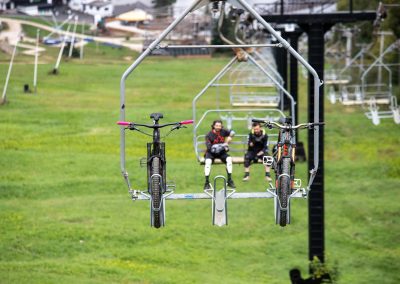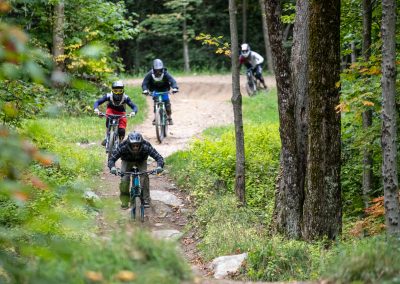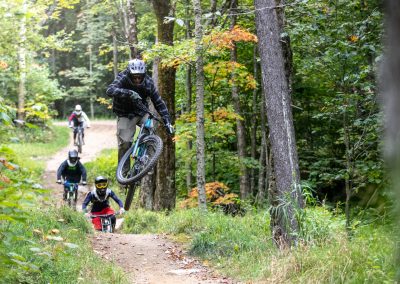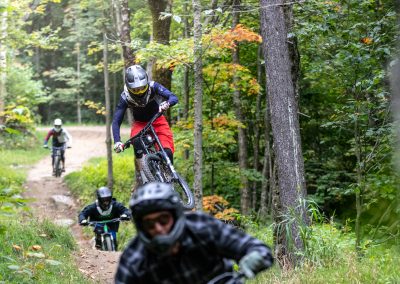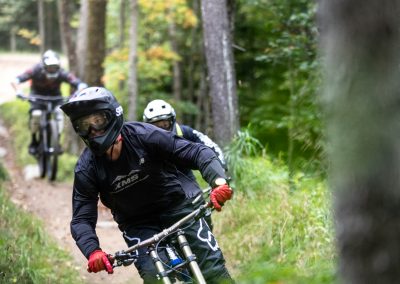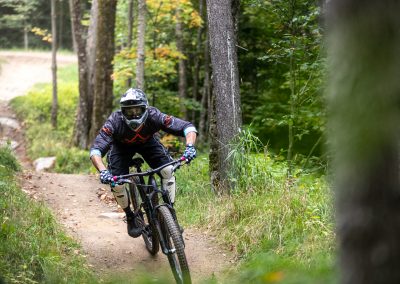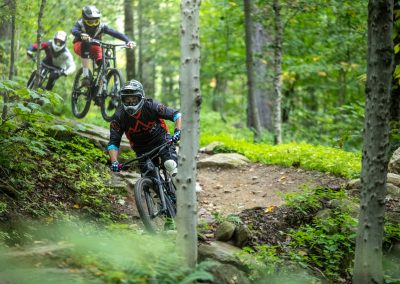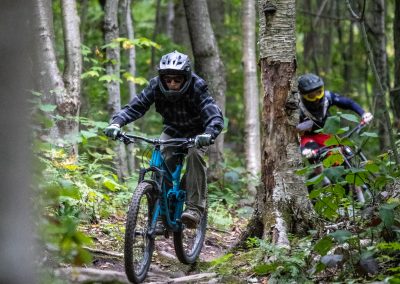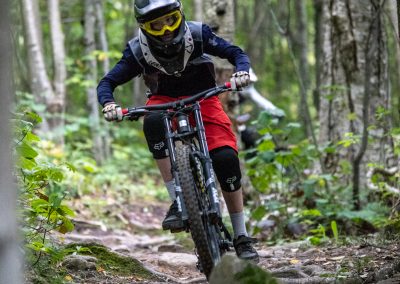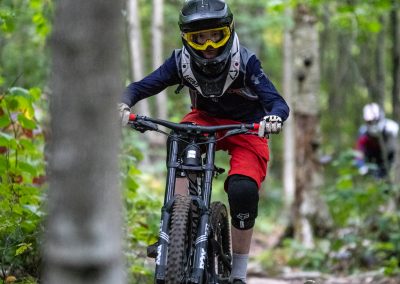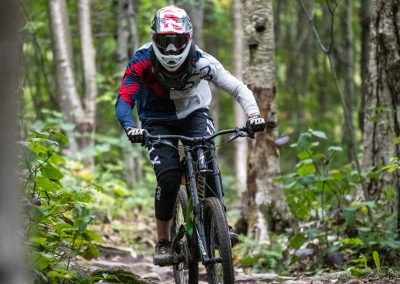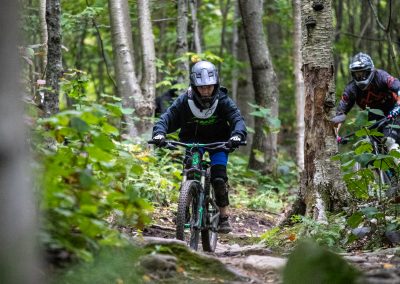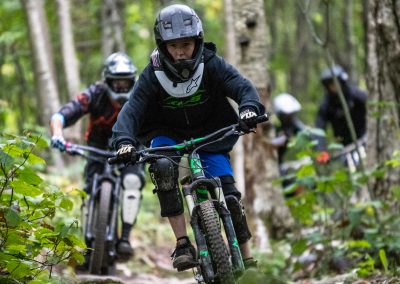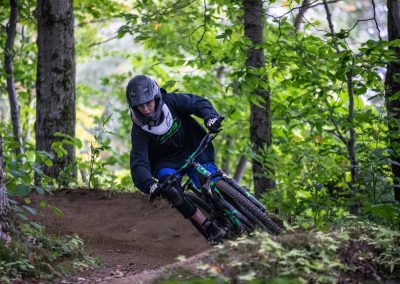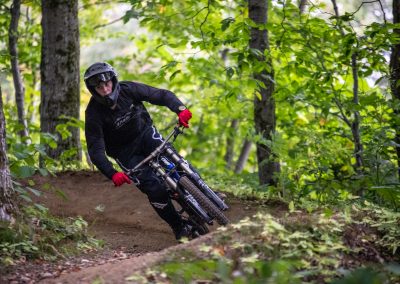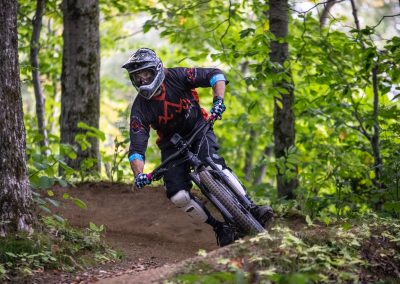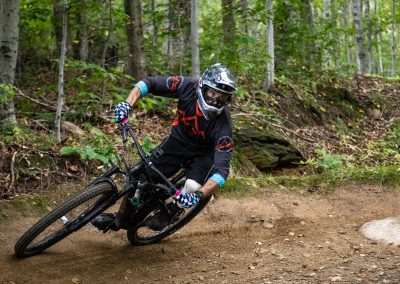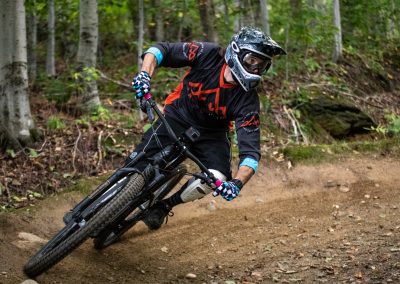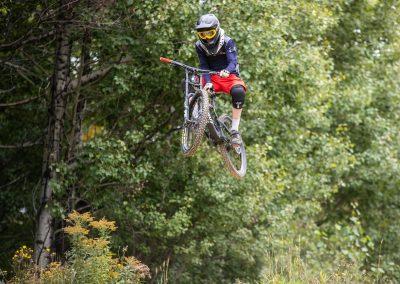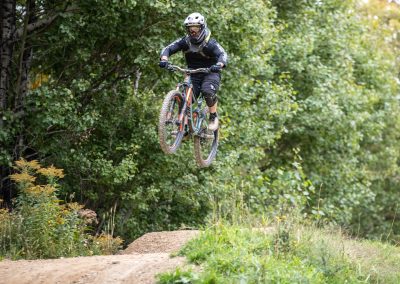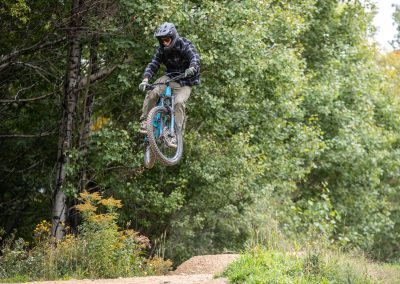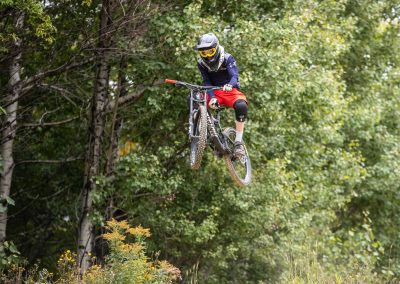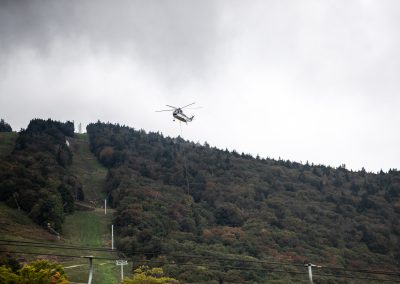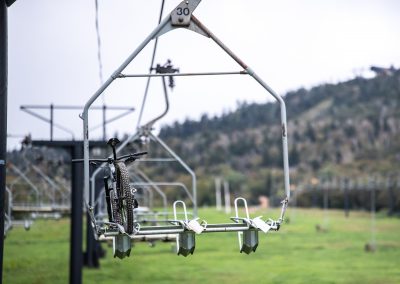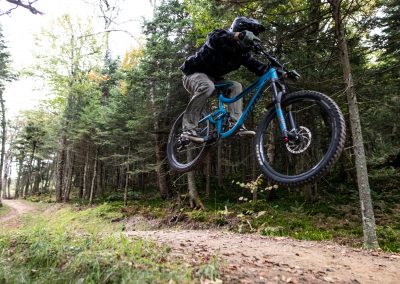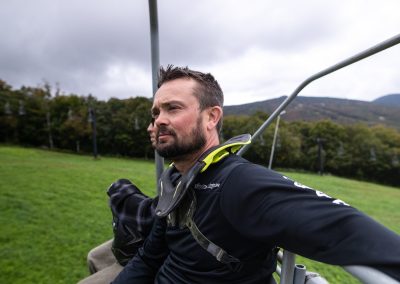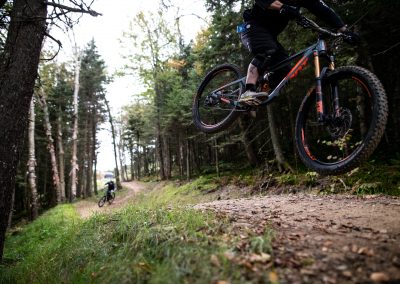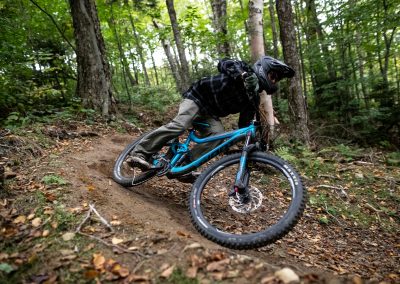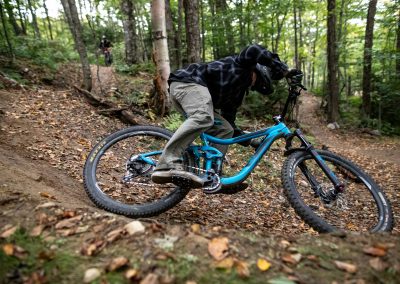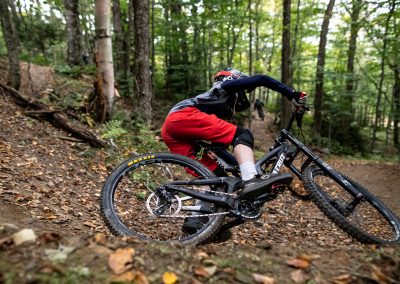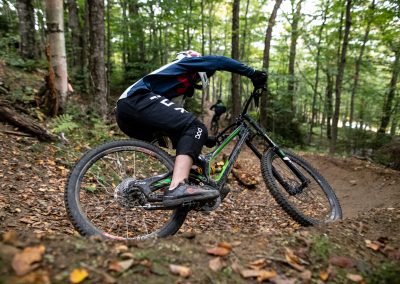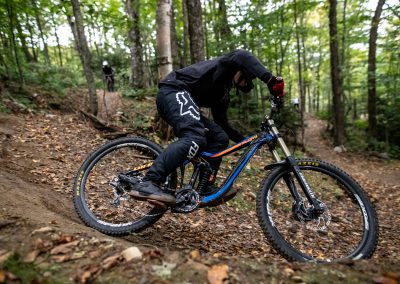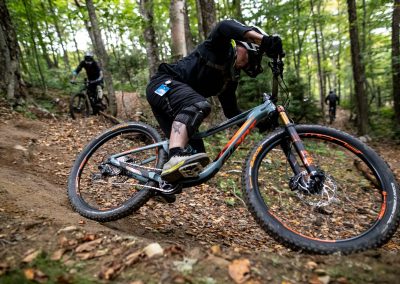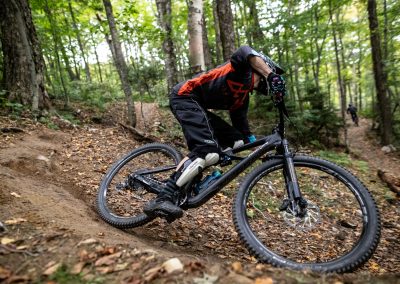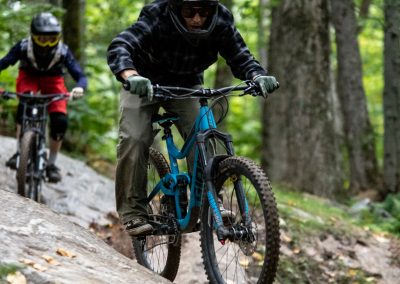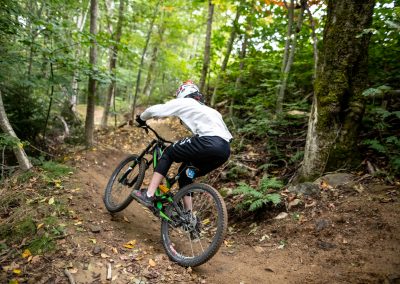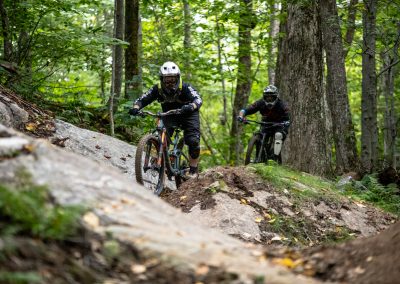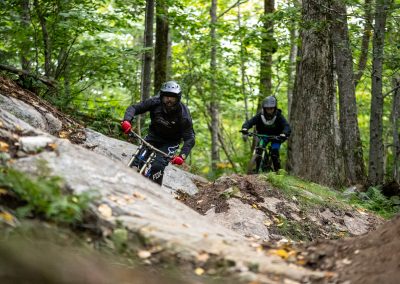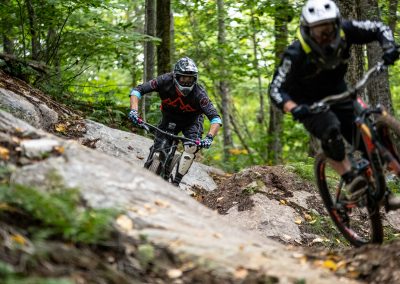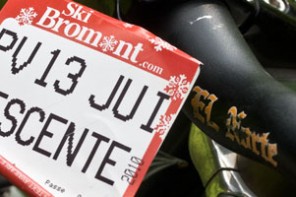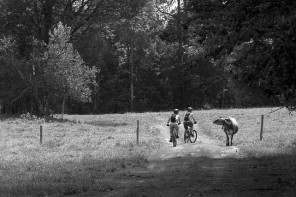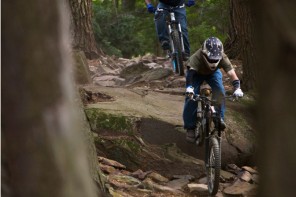Photos by Ansel Dickey
Let me preempt the following by stating unequivocally that I have no empirical evidence for the claim, but will issue it here as a matter of absolute fact based on years of observation and first hand experience: bicycles make kids into better humans. One could, I suppose, say the same for any number of pursuits, and any devotee of skateboarding, fishing, art, golf, baking, cross stitch, jai alai, butter sculpting and so on could likely make the same contention. However, in my humble opinion, there’s no better way to bridge demographic chasms, span differing ends of the human spectrum, or pursue a simple sense of independence than via a bicycle.
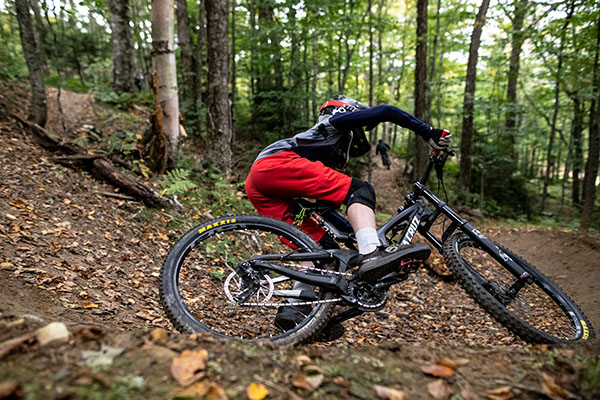
Now take that notion that led us all to bikes in the first place, the notion that bikes are a catalyst for creativity, human potential, freedom, and growth both mental and physical – add some skills-based learning, an idyllic mountain setting, and the northeast’s finest bike park, and you’ll find yourself at the Killington Mountain School in Killington Vermont.
This past September, I had the opportunity, nay privilege, to visit Killington Mountain School to spend some time shredding and chewing the fat with head coach Jeff Juneau and the newly formed Mountain Bike Gravity Team. Hot laps with these skilled youngsters was the order of the day. Joining us was head Snowboard Slopestyle coach Devon Gulick, as well as retired pro road racer, photo-wiz, social media Jedi, and KMS alum Ansel Dickey (side note: if you ever get a chance to ride with Ansel, he’ll drop you on both the climb and the descent, all while wearing a 40 pound bag full of camera gear. You’ve been warned.)
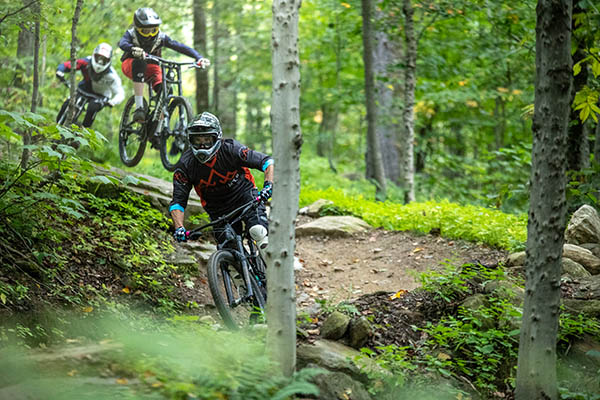
KMS as it’s known colloquially and for the sake of this story’s word count, has had a competitive cycling program for some years now, but this season is the first geared towards riders who favor big tires and long travel bikes.
Let’s take a moment to truly appreciate what’s happening here at KMS: a high school mountain bike gravity team focused entirely on downhill and enduro disciplines. Read that again. A freaking high school mountain bike gravity team! Now go back in time a bit, put yourself in a 14-year-old kid’s mind and try to wrap your head around this concept. Should I play football? Baseball? Try out for the track team? Nah, I think I’ll learn to race DH and enduro instead. Good god. It’s damn near unfathomable! But this dream is now a reality.
In chatting with the coaches, KMS stands in seemingly stark contrast to the stereotypical athlete-factories churning out Olympians these days. Little if any emphasis is placed on results; instead, process and progress are linchpins; strive for an intrinsic neutrality toward results, glean what you can from each experience, don’t worry about the podium. Very zen, but for an aging pseudo-hippie like myself, resonant.
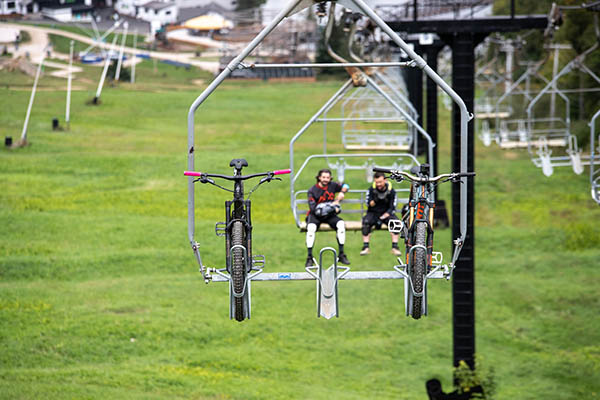
The funny thing is, the youngsters with whom I rode seem hyper aware of both the unorthodoxy and general radness of the program. Some are here to compete, some are here just to hone their fitness, air awareness, and other skills translatable to pursuits like slopestyle skiing and snowboard cross. An appreciation of their situation, however, is not lacking in any way.
The cycling program began in earnest at KMS in 2009. KMS, an institution generally known for its ski and snowboard programs, has served as the springboard for several highly successful road, cross-country and cyclocross careers. The aforementioned Mr. Dickey, perhaps the most noteworthy of this crop, not only serves as a mentor to the kids on the team, but is also a seasoned veteran who spent the better part of a half-decade traveling the globe and racing his bike for a living. “China is the craziest. I could tell you stories for days about racing over there,” says Ansel in a humble tone utterly devoid of braggadocio or self-congratulation.
“I was an alpine ski racer. But I sucked. I was really bad. One of my coaches asked me to try a road race and I won the first five I entered. I learned pretty fast that my body was not meant to fight gravity the way I was in skiing, but that I was way better suited to riding bikes really fast.” Ansel credits his time at KMS and the astute eye of the coaching staff for his transition from back-of-the-pack ski racer to successful pro cyclist.
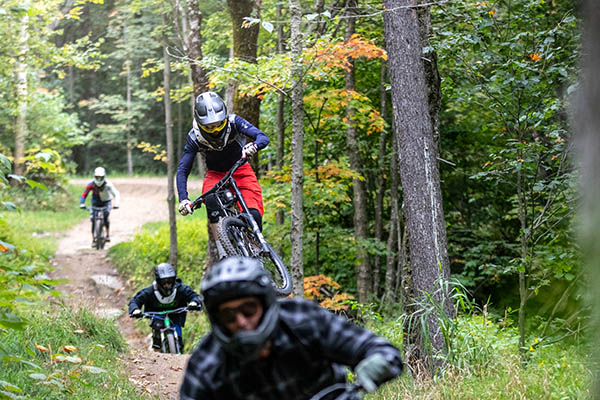
Today, Ansel runs his own social media consulting business, teaches part time at KMS, and fills in the gaps as a professional photographer. Despite his quiet demeanor, Ansel’s is the type of confidence most cyclists aspire to: rolling up to the chairlift on this cool fall afternoon, he’s shod in a half shell roadie lid, flyweight pointy XC shoes, and a form fitting race-inspired kit. The rest of us by contrast are wearing full face helmets, flannels or ¾ length jerseys, and running flat pedals. Atop our first run, we drop in and Ansel unceremoniously sets a vicious downhill pace that’s tough to match, all while wearing a massive camera bag.
Riding up the Snowshed lift, I get a chance to dive a little deeper on the ins and outs of KMS’s unique Gravity MTB program, in the process discovering a common thread shared by the coaches at KMS; success is not measured in terms of victories but in the unquantifiable currency of personal growth. “We’re building good humans here, not just good athletes,” says Jeff Juneau, head coach and architect of KMS’s newest two-wheeled endeavor.
Jeff’s resume is packed with relevant and real world experience spanning all ends of the cycling spectrum. He’s as gregarious and affable a guy as you can imagine – his boyish look and skills on a bike belie his several-years-past-40 vintage, as does his general enthusiasm. The kids clearly like and respect Jeff, hanging on his words and emulating his good natured disposition.
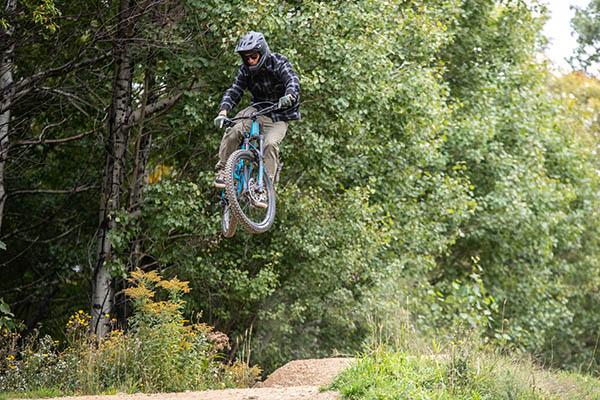
“We’re process and progress driven,” says Jeff. “This program is not about winning.” When I needle Jeff between laps on how he and the athletes square this ethos with the “competitor’s mindset,” (which by definition is results-driven), he elaborates. “Competition is a means by which we can better understand a sport. By participating and observing, the athletes are able to learn from a first hand perspective, without necessarily being concerned with the podium. It removes the fear of the unknown, enables a deeper understanding, and ultimately leads to greater performance both on and off the bike.”
With a moment’s consideration he adds, “It’s about how you prepare, how you execute, and ultimately how you treat your fellow athletes that really matters. Teaching these kids to be good people is way more important than seeing them win.”
Jeff’s counterpart on the endurance side of the orbit, Brad Ramsay, echoed this sentiment when we had a chance to chat a few hours earlier: “As long as they’re passionate and psyched, that’s all I care about. Just go out and be yourself, do the best you can do. That’s all I’m looking for.” Brad’s got the kind of lean outward appearance common to endurance athletes, and his office is at once austere and welcoming. We conversed at his desk where behind him hang an assortment of medals and coach’s passes spanning a decade’s worth of races. Replete with six of the one-piece-desk-chair amalgamations ubiquitous in any middle or high school, this office also doubles as a classroom.
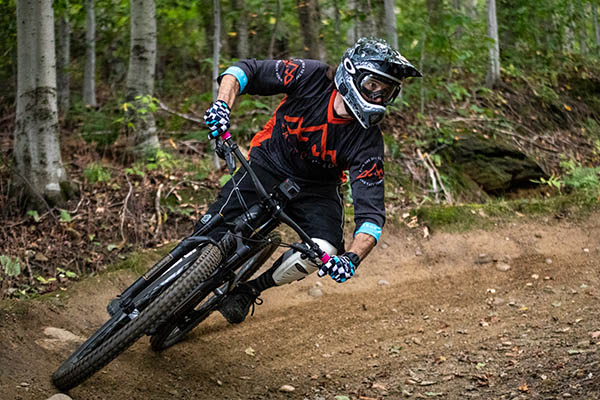
“Classes at KMS are small: mostly six kids, maybe ten max. The interactions we can have with the kids, the way we can test for understanding in a setting as intimate as this is incomparable from a teaching perspective,” says Brad.
Anyway, back to the action. Dropping in on our first lap, I’m unsure what to expect; despite the program’s infancy in this, the first year as an actual team sport, the small cadre of young rippers spanning several middle and high school grades are all poised and confident, astride full-on DH bikes. And it becomes quickly apparent that they know how to handle them.
The skills gleaned under Jeff’s watchful eye are borne out on Rabbit Hole, Blue Magic, and Krusty. Hoots and hollers abound with each lap; “I one-handered the Whip Jump.” “Man I tried to scrub the take off and landed straight to flat!” It’s tough not to get wrapped up in the stoke these kids emit and are all too happy to share.
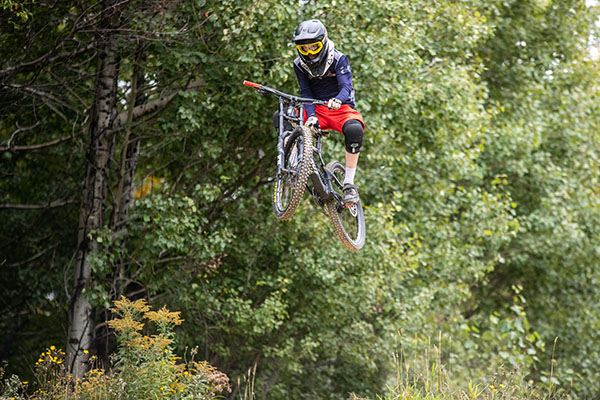
But the underlying theme is one of practical application: Jeff explains that concepts like independence, self-confidence, and leadership are picked up through osmosis at KMS’s athletic programs. Despite the lack of overt reference to these vital tools, they’re foundational elements in both scholastic and extracurricular endeavors: “Those aren’t necessarily skills that we teach, but they’re woven into the fabric of each discipline we coach.”
It’s not all hot laps and one-handers though; at the end of the day (or sometimes the beginning) these kids are here to learn. Here’s a rough summation of a day in the life:
- 7 a.m. to 8 a.m. Gym time for flexibility, core strength, and injury prevention
- 8 a.m. to 1 or 2 p.m. School
- 2 p.m. to dark “Practice”
- Evening Homework and studying
(During the fall and winter months when daylight is at a premium, they flip the schedule on its head, studying during the early and later dark hours, and using valuable daylight to train and work out; the stuff of legend for every day-dreaming kid out there!)
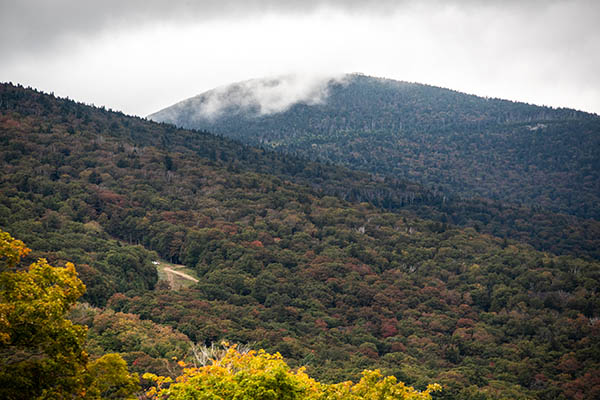
“Practice” in the context of this team means a lot of different things: some days it’s hammering out laps in the Killington Bike Park and focusing on fundamentals and technique. Other days it’s doing some road riding and building fitness. And others, trying one’s hand in a cross-country race to sharpen all-around bike skills. “Practice” indeed.
Coach Jeff’s heavily tattooed arms stand in stark contrast to his on-trail stature with the kids: haranguing a group of teenage boys hopped up on adrenaline seems to come easy to Jeff though, as he spouts simple instructions to keep the crew on task. We stop at intersections and I pry the kids with the standard MTB-related questions: machine built or natural trails? Freeride or racing? I’m met with confidence and eye-contact: “Jumps! All day!” “No way, natural gnar!”
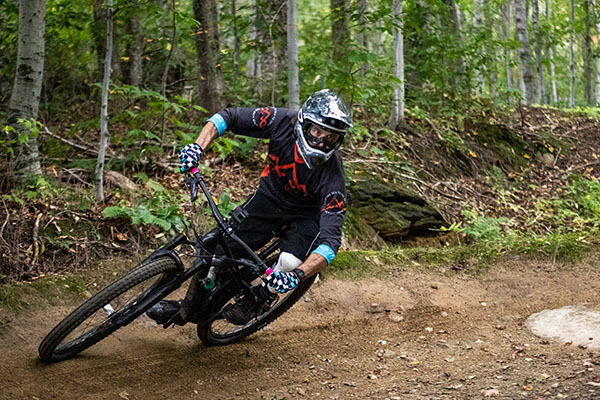
Back in the parking lot as I prepare to head home, Jeff, Ansel and myself quickly debrief. Although I’ve known these guys only a few hours, we depart with hugs and assurances of more days like the one we just had. I leave awash in that kind of endorphin-induced euphoria found only among good people and shared experience.
After spending the day with the KMS bike posse, the real takeaways are two-fold. One the one hand, KMS has struck gold by leveraging their proximity to Killington’s bike park, along with their coaching pedigree and willing seasonal athletic pool to come up with a program unique among its peers. I would highly recommend any scholastic athlete who’s even curious about pursuing competitive cycling to pay KMS a visit. The friendly staff, and uncommonly enthusiastic students will win you over. And if that doesn’t work, the trails at Killington will likely reel you in.
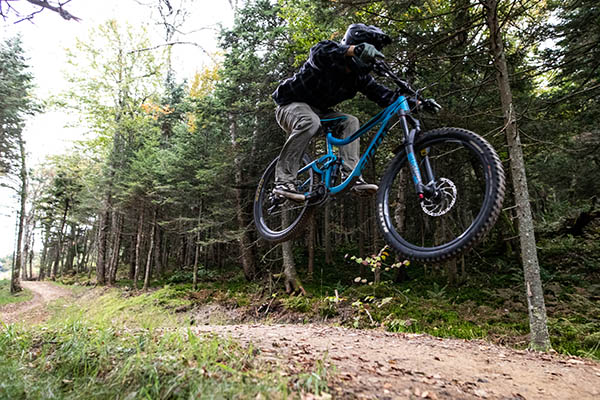
But the bigger takeaway is the potential long term net benefits wrought by a program like this. These student athletes are being taught some of life’s most valuable lessons through first hand experience. Not passively or metaphorically. When I think about the type of young adult that will graduate from this program having learned the value of hard work, of physical fitness, of teamwork, and general human decency, it renews my faith in the future of humankind.
On a more personal level, I’m a bit envious: I was a scrawny, late blooming, uncoordinated kid that far preferred skateboarding, snowboarding, art, and other individualistic pursuits to the traditional stick and ball sports so it brings a smile to my face knowing that kids like me will have an outlet to pursue their own athletic proclivities outside the prescribed realm of “normal” high school sports.
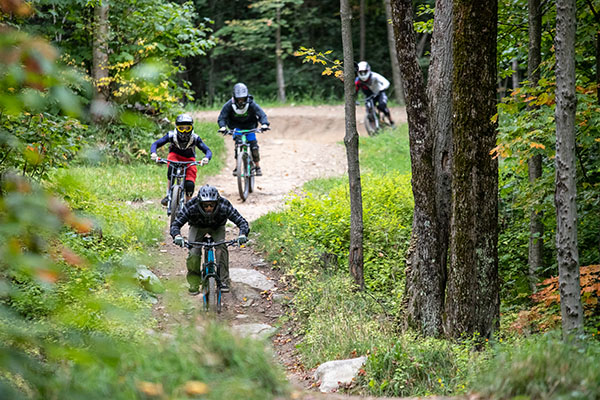
If people like Ansel Dickey and the current crop of team riders on KMS’s Gravity MTB team are any representation of the fruit this program can bear, of the power of cycling, then be encouraged. As they say, the kids are alright.
If you’d like to learn more about Killington Mountain School and its Cycling Programs (gravity, XC mountain, or road), you can do so via the following channels:
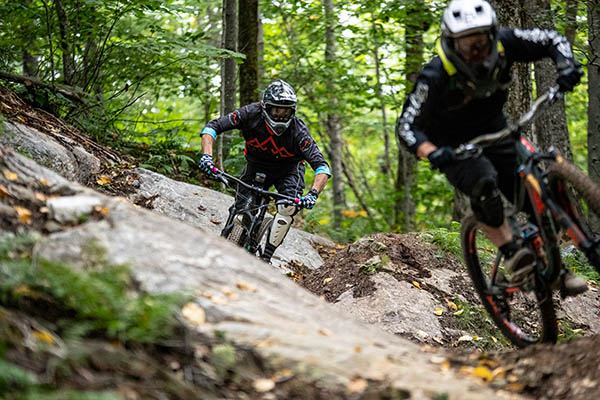
If you’d like to learn more about Killington Mountain School and its Cycling Programs (gravity, XC mountain, or road), you can do so via the following channels:
- Head Gravity MTB Coach Jeff Juneau: jjuneau@killingtonmountainschool.org
- Headmaster Tao Smith: tsmith@killingtonmountainschool.org
- Director of Communications Amy Allen: aallen@killingtonmountainschool.org
Evan Chismark is a contributing writer for Mountain Bike Vermont, and also holds the auspicious title of Intergalactic Commander at Ranch Camp in Stowe, Vermont.

